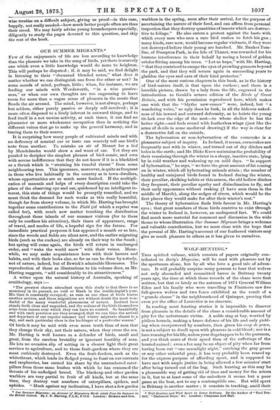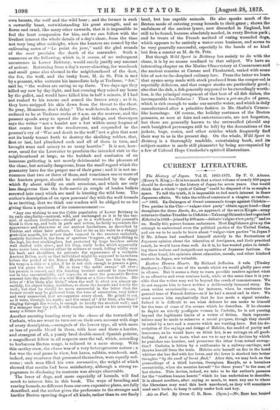WOLF-HUNTING.*
Tins spirited volume, which consists of papers originally con- tributed to Bally's Magazine, will be read with pleasure not by the sportsman alone, but by all who love a good tale of adven- ture. It will probably surprise many persons to hear that wolves not only abounded and committed havoc in Brittany twenty years ago, the time at which these records of the chase were first written, but that so lately as the autumn of 1874 General William Eden and his family who were travelling in Finisterre saw five full-grown wolves and two foxes exhibited as the result of a "grande chasse" in the neighbourhood of Quimper, proving that even yet the office of Louvetier is no sinecure.
In reading most hunting stories it is impossible to dissever from pleasure in the details of the chase a considerable amount of pity for the unfortunate victim. A noble stag at bay, worried by pitiless hounds, making a brave defence of his life and only yield- ing when overpowered by numbers, then given his coup de grace, is not a subject to dwell upon with pleasure in cold blood ; nor is a hare running for his life, unless your dogs happen to be the pursuers, and you think more of their speed than of the sufferings of the hunted animal ; even a fox may be an object of pity when far from having been out " one moonlight night," catching the gray goose or any other unlawful prey, it has very probably been reared up for the express purpose of affording sport, and is supposed to have met with ample justice in being allowed a few minutes' start after being turned out of the bag. Such hunting as this may be a pleasurable way of getting rid of time and money for the actors in it, but to at least some of the onlookers it seems but a poor game at the best, not to say a contemptible one. But wild sport in Brittany is another matter ; it consists in tracking, amid their • Wolf-Bunting and Wild Sport in Lower Brittany. By the Author of "Paul Pen- dril," "Dartmoor Days," to. London: Chapman and Hall. own haunts, the wolf and the wild boar ; and the former is such a cowardly beast, notwithstanding his great strength, and so fierce and cruel, like many other cowards, that it is impossible to feel the least compassion for him, and we can follow with the liveliest interest the whole details of a day's chatte, from the time not very long after midnight, when the hunters are roused by the enlivening notes of " Le point du jour," until the glad sounds of the snort proclaim the death of the marauder. Such a summons as the following, which is, it seems, of no unfrequent occurrence in Lower Brittany, would surely justify any amount of ardour. Returning from a day's cover-shooting, for woodcock and small game also abound in the neighbourhood of the deer, the fox, the wolf, and the tusky boar, M. de St. Prix is met by a peasant, who entreats his immediate help at Trefranc, " for," said he, " the wolves are eating us up there. Two days ago they killed my cow by day-light, and last evening they seized my horse by the gullet, and would have killed him in half a minute, if I had not rushed to his rescue and scared the brutes away ; as it is, they have stripped his skin• down from the throat to the chest. So pray, Monsieur, don't delay." The wolf-hounds are, therefore, ordered to be at Trefranc rocks at 8 a.m. on the morrow, and the peasant speeds away to spread the glad tidings, and thereupon says the writer " not a hamlet nor a but within many leagues of that centre but knew the rendezvous, and responded to the peasant's cry of War and death to the wolf !' not a glen that sent not its hardy tenant forth to destroy the skulking robber, that, first or last, had plundered each and all of them in turn, and brought want and. misery to so many hearths." It is not, how- ever, usual for the Louvetier to proclaim the intended visit to the neighbourhood at large, as the hubbub and confusion of an immense gathering is not merely detrimental to the pleasure of the chase, but actually dangerous, from the small regard which the peasantry have for the proper use of their guns ; and it is not un- common that two or three of them, and sometimes one or more of the hunters proper, should be seriously wounded by the slugs which fly about wildly on such occasions, and which are only less dangerous than the balle-marie'e (a couple of leaden bullets screwed into one) which are used in hunting the wild boar. The author's description of an open peasants' day with the wolf-bounds i$ so inviting, that we think our readers will be obliged to us for giving them a specimen of its commencement :— "Any one wishing to see the Celtic population of Lower Brittany in its rode simplicity—natural, wild, and unchanged as it is by the var- nish of modern civilisation—should go to a wolf-hunt ; the peasant's blood is then up, and both in garb and action, he fairly represents the appearance and character of our ancient forefathers, as described by Tacitus and other later authors. Clad so far as his waist in a shaggy goat-skin mantle, his nether limbs encased in the coarsest sackcloth, quaintly fashioned in the form of spacious bragues , or tight-fitting to the legs, his feet stockingless, but protected by huge beechen sabots well stuffed with straw, and his long, curly locks, which apparently have never boou violated either by scissors or comb, falling wildly over his back and shoulders, ho presents the appearance of a veritable Ancient Briton. such as that individual might be supposed to have been before the period of the Saxon Heptarchy. Then see him in chase, his weapon a club or a pike, if he is not rich enough to possess a gun, and his game the wolf. He is then 'the noble savage' all over ; his passion is roused, and the hunting instinct natural to man blazes out in him uncontrollably, end converts at once the peaceable Breton peasant into the similitude of a wild Huron or a Crow-foot Indian. His cries of A'hr bleiz, a'hr bleiz !' when the wolf is afoot are almost un- earthly, his object being, doubtless, to cheer the hounds and terrify the wolf ; but that he should be more successful in the latter than the former result may be gathered from the tone of execration, very bitter and very unmusical, that accompanies every shout. He grinds it out, as it were, through his teeth; and the sound of ' A'hr bleiz, a'hr bleiz I' ringing through the woods, is enough to terrify the stoutest wolf ; and if a stranger hear the yell, it will remain impressed on his memory for many a future day."
Another amusing hunting story is the claasse of the townsfolk of Carhaix, who are wont to turn out on their own account with dogs of every description,—mongrels of the lowest type, all with more or less of poodle blood in them, with here and there a harrier, and strangest of all, a purely bred double-nosed Spanish pointer, a magnificent fellow in all respects save the tail, which, according to barbarous Breton usage, is reduced to a mere stump. With this motley crew, the chasm was of a very heterogeneous nature ; a fox was the real game in view, but hares, rabbits, woodcock, and, indeed, any creatures that presented themselves, were equally wel- come; each man filled his own carnassiire, the weight of which showed that results had been satisfactory, although a strong re- pugnance to disclosing its contents was always observable.
The lover of dogs, and more especially of hounds, will find much to interest him in this book. The ways of breeding and rearing hounds, so different from our own expensive plans, are fully described, and the author gives the preference to the stronger and hardier Breton sporting dogs of all kinds, rather than to our finely bred, but less capable animals. He also speaks much of the Breton mode of entering young hounds to their vane ; shows the usefulness of the ancient lymer, now discarded in England, but still to be found, because absolutely needed, in every Breton pack and he treats of the French method of curing wounded dogs, which appears to be entirely a water-cure business, and seems to be very generally successful, especially in the hands of so kind but firm a master as M. de St. Prix.
But though Will Sport in Brittany has mainly to do with the chase, it is by no means confined to that subject. We have an interesting chapter on the Marine Observatory at Concarneau and the ancient remains at Carnac and Plouharnel, varied with some bits of not-to-be-despised culinary lore. From the latter we learn that oyster-soup made with stock produced from the conger-eel is especially delicious, and that conger steaks are particularly good ; also that the dab, a fish generally supposed to be exceedingly worth- less, is the principal component of that best of all fish dishes, the incomparable bouillabaisse ! Then we have a pot-au-feu of game, which is rich enough to make our mouths water, and which is daily manufactured after a primitive fashion in Mr. Shaf to's Crime- like hermitage. Of course, the holiday costumes of the Breton peasants, as seen at fairs and entertainments, are not forgotten, but these are generally known to the untravelled (should any such benighted personages still be left) by the decorations of the jackets, bags, cosies, and other articles which frequently And their way to us in the present day. On the whole, Wild Sport in Brittany is a thoroughly readable, entertaining book, and its subject-matter is made still pleasanter by being Accompanied by a few of Colonel Hope Crealocke's spirited illustrations.































 Previous page
Previous page